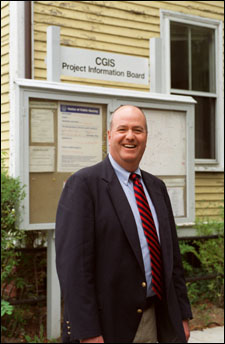Finding ways to ease impact of construction:
Web site, on-site managers, ease neighbors’ trials

Charlie Connor was at home one night about a month ago when a call came in from Harvard’s Operations Center, saying that a racket coming from Coolidge Hall had prompted a neighbor to complain.
Connor headed out and met the resident at Coolidge to find a part of an air circulation unit had come loose and was flapping around, making the din. Connor unplugged the unit and quiet settled again over the neighborhood.
“The call came in at 9:30 and by 11 it was taken care of,” Connor said. “I met with the construction manager and crew the next morning to figure out how to make this not happen again.”
Connor is one of two construction mitigation managers who spend their days on-site at the two major projects that Harvard has under way in Cambridge: the Center for Government and International Studies (CGIS) – part of which will stand where Coolidge Hall now is – and an underground parking garage near the corner of Oxford and Hammond streets.
The mitigation managers are there to respond to neighbors’ concerns and are just part of a new effort by Harvard to increase its attentiveness to and communication with people living near construction sites.
“For the past 15 to 20 years, the University has had relatively little building activity at the campus’ edge with the neighborhood,” said Harvard’s Senior Director of Community Relations Mary Power. “But the remaining developable areas of Harvard’s Cambridge campus tend to be located where the campus meets the neighborhood. Construction mitigation matters to us now in a way that it didn’t before.”
Communication is key to the mitigation effort, Power said. She and other community relations staff are in weekly touch with neighborhood groups. Monthly community meetings on the projects are a regular part of the agenda. In addition, the University has established a construction mitigation call center where neighbors can call with concerns and has erected bulletin boards near each site where regular construction updates and contact numbers are posted.
The University has also created an e-mail information list to provide neighbors with regular updates and a construction project information Web site. That site also has updates, as well as phone numbers for Connor, who serves as mitigation management director, and for Chris Hurley, who is the field operations supervisor and the other mitigation manager.
“There’s really a whole range of measures that are new to Harvard to address this important set of concerns neighbors have raised,” Power said. “Improving communication is a very big piece of managing construction well.”
Neighbors to Harvard’s construction projects applaud the University’s efforts and are hopeful that the attention to mitigation will ease the long haul of dealing with trucks and dust and noise that they are bracing for.
Willie Bloomstein, a member of the Agassiz Committee on the Impact of Development, gave Harvard high marks for its mitigation program. But Bloomstein said the proof as to whether the program works will be seen over time. The potential impact on the neighborhood from this and any future projects Harvard constructs in the area will be large, mitigation or not, Bloomstein said, but communication and quick response can certainly help.
“It’s going to be hard, and a real challenge to the neighborhood,” Bloomstein said. “I applaud Harvard’s efforts to put together construction mitigation. In theory it’s a good idea, in reality, I don’t know yet.”
Richard Silver, who lives near the garage site on the corner of Hammond and Gorham streets, has been selected by the neighborhood to be a liaison with the University. He said the city of Cambridge had similar mitigation managers on site for the sewer separation work, which helped neighbors deal with the disruption of that project.
“That is what Harvard proposes to do and I applaud them for it,” Silver said. “We don’t want to be placated, we want to believe that when someone says, ‘I’ll take care of it,’ it’ll be done.”
The Web site can be reached at http://www.construction.fas.harvard.edu




